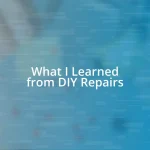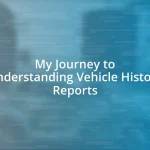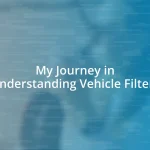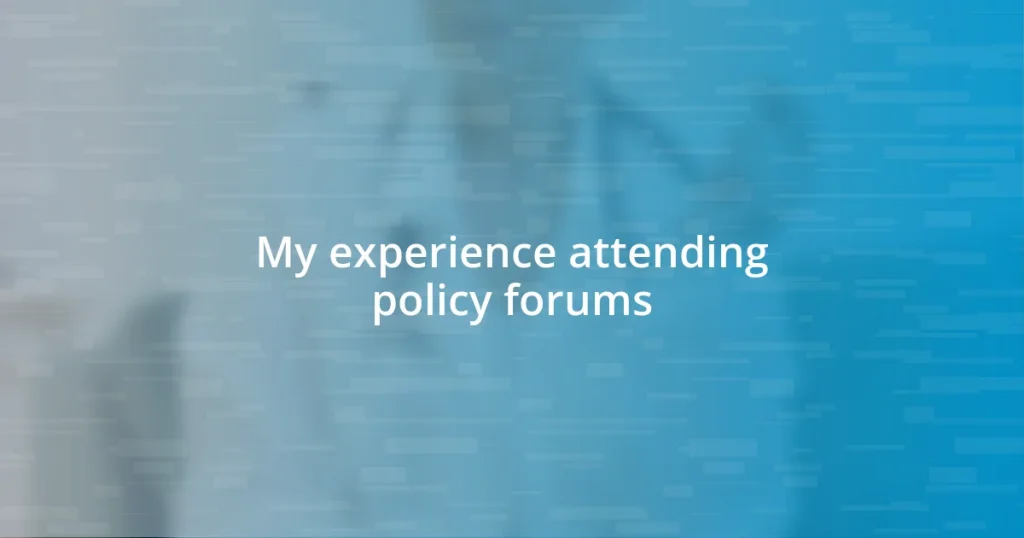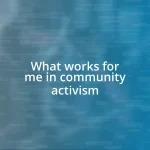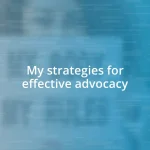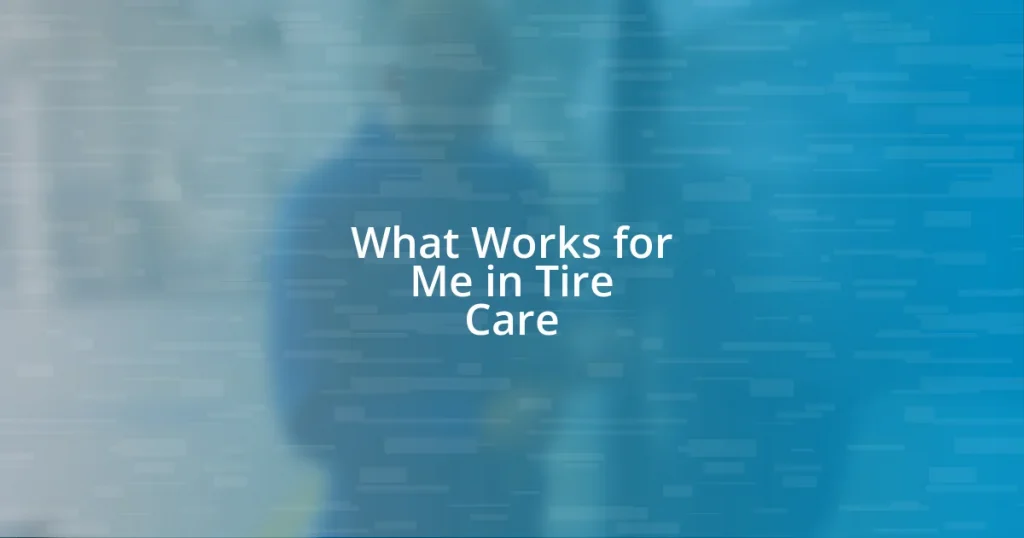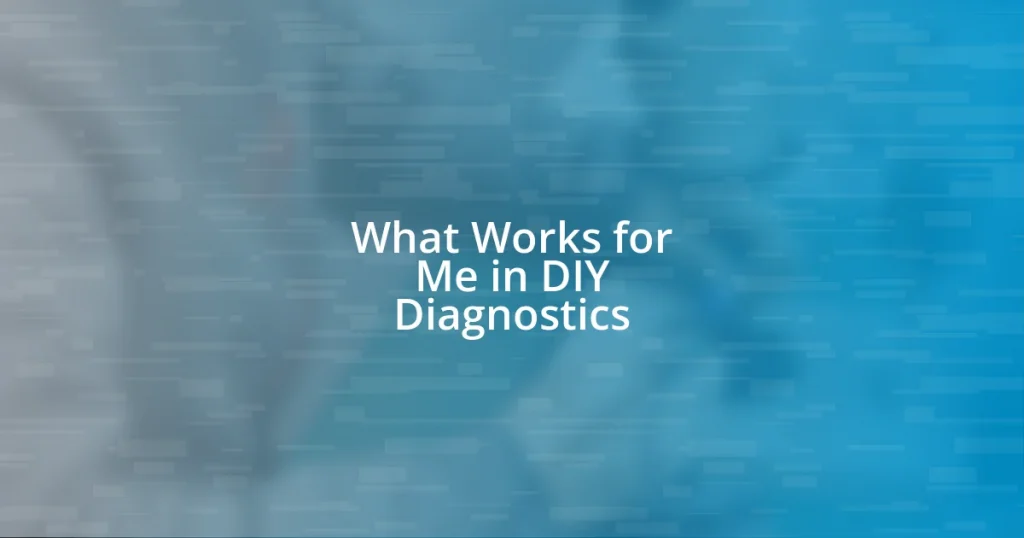Key takeaways:
- Policy forums facilitate diverse discussions that inspire participants and can lead to meaningful action and collaboration.
- Effective preparation and strategies such as active listening, speaking your truth, and non-verbal communication enhance participation and influence.
- Following up after forums by expressing gratitude, sharing insights, and setting meetings can solidify connections and drive impactful changes.
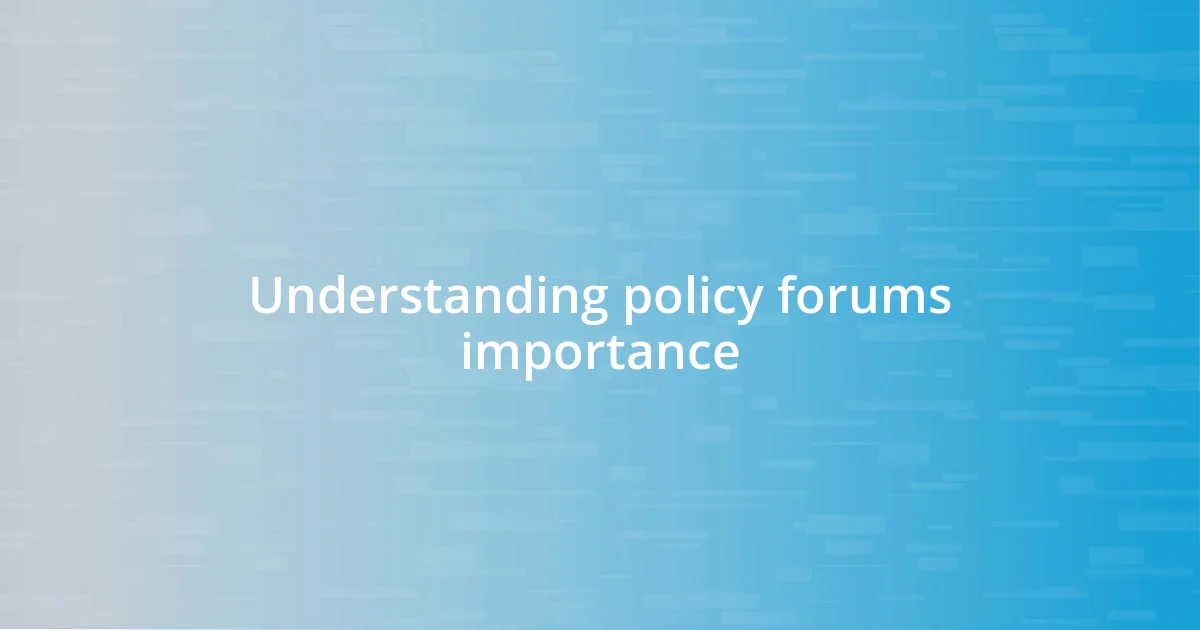
Understanding policy forums importance
Policy forums play a crucial role in shaping public discourse. I remember my first forum where I felt the gravity of collective insight. Have you ever felt the energy in a room filled with passionate individuals discussing pressing issues? It’s electrifying and serves as a reminder of how vital these discussions are.
Attending these forums not only enhances our understanding but also broadens our perspectives. I often found myself engaging with people who held contrary opinions, and it was eye-opening. Isn’t it fascinating how listening to diverse viewpoints can spark new ideas? I left each session feeling inspired and more informed than before.
Moreover, policy forums create a space for real-world change. I’ve seen how discussions turn into action when participants share their experiences and solutions. Have you witnessed an idea transform into policy simply because a dedicated group chose to collaborate? That’s the beauty of these gatherings—they empower us to be a part of something greater.
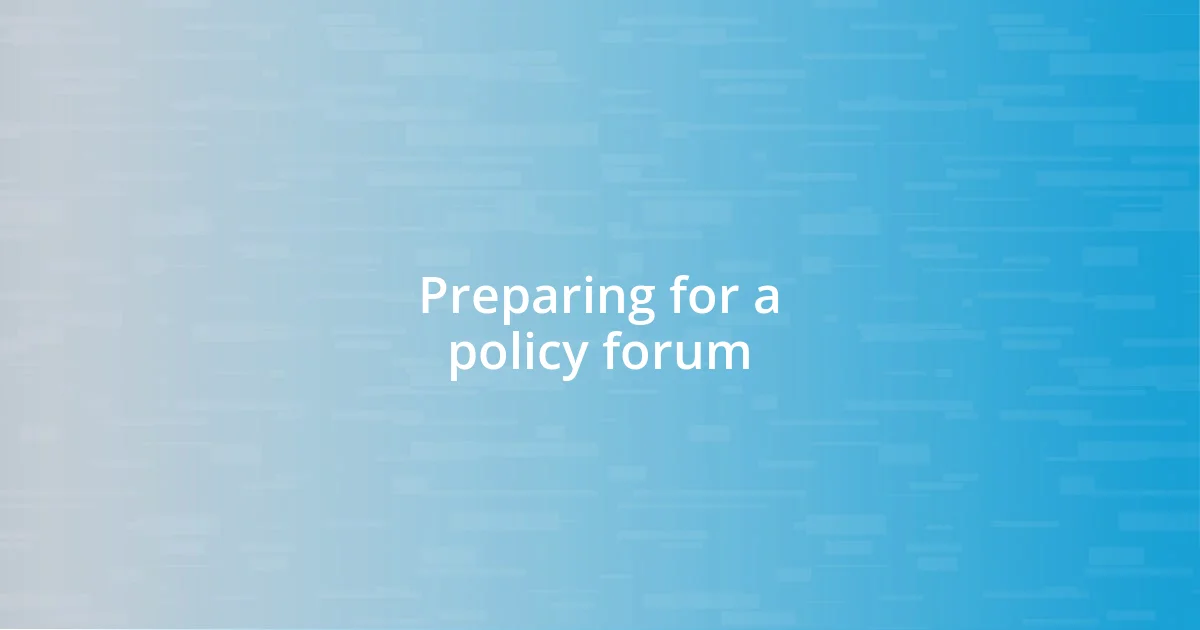
Preparing for a policy forum
Preparing for a policy forum requires meticulous planning, as it sets the stage for your participation and engagement. During my first experience, I remember feeling a mix of excitement and anxiety, which was alleviated when I prepared thoroughly. Developing a clear objective for what I wanted to achieve helped me focus my energy. A few simple steps can make a big difference:
- Research the topics to be discussed, including the background and key players.
- Prepare questions in advance that reflect your interests and concerns.
- Gather relevant data or examples to support your viewpoints.
- Reach out to potential contacts you may want to connect with during the event.
As I reflect on my preparation, I recall the time I took a deep dive into data on a controversial policy issue. It was like uncovering hidden gems that would later inform my discussions. Engaging with the material not only boosted my confidence but also ignited my passion for the topic. I felt like I was stepping into the forum with a toolbox of knowledge, ready to contribute effectively to the conversation.
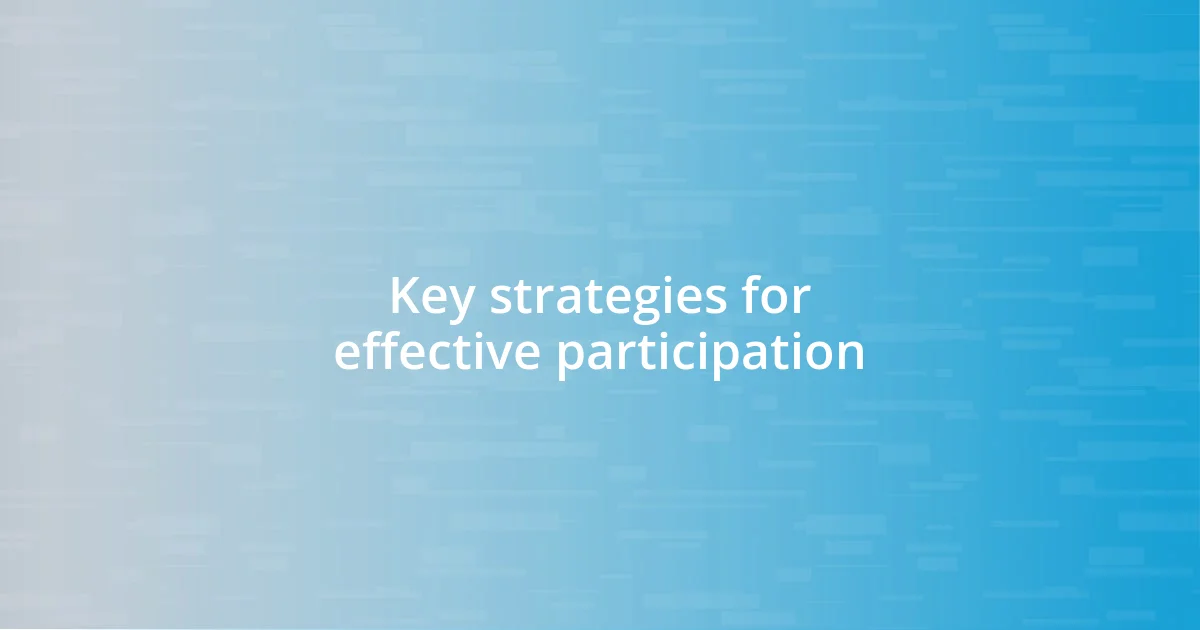
Key strategies for effective participation
Effective participation in policy forums hinges on specific strategies that can elevate your influence. Based on my experience, I’ve found that active listening is one of the most vital skills to cultivate. In one forum, I decided to really focus on understanding not just what was being said, but the underlying emotions and motivations behind the comments. This approach changed my perspective; it allowed me to connect with others more authentically. Have you ever noticed how a simple nod or follow-up question can transform a conversation into a meaningful exchange?
Another key strategy is speaking your truth. I remember a moment when I hesitated to voice a controversial opinion during a discussion. Yet, when I finally decided to share my perspective, I was met with unexpected support and validation from others in the room. This experience taught me that sharing my unique viewpoint contributes to the overall richness of the dialogue. Isn’t it empowering to realize that your voice matters, even when you feel uncertain?
Lastly, being aware of non-verbal communication can enhance participation significantly. At one event, I observed how the body language of speakers influenced the crowd’s engagement. I made it a point to maintain open posture and eye contact when I shared my thoughts. Doing so not only helped me feel more confident but also encouraged others to engage with me constructively. How do you think practicing awareness of your own body language could impact your participation?
| Strategy | Description |
|---|---|
| Active Listening | Engaging with the speaker’s message to understand underlying emotions and clarify points. |
| Speaking Your Truth | Sharing your unique perspectives, even if they are controversial, to enrich the discussion. |
| Non-verbal Communication | Using body language and eye contact to enhance connection and encourage dialogue. |
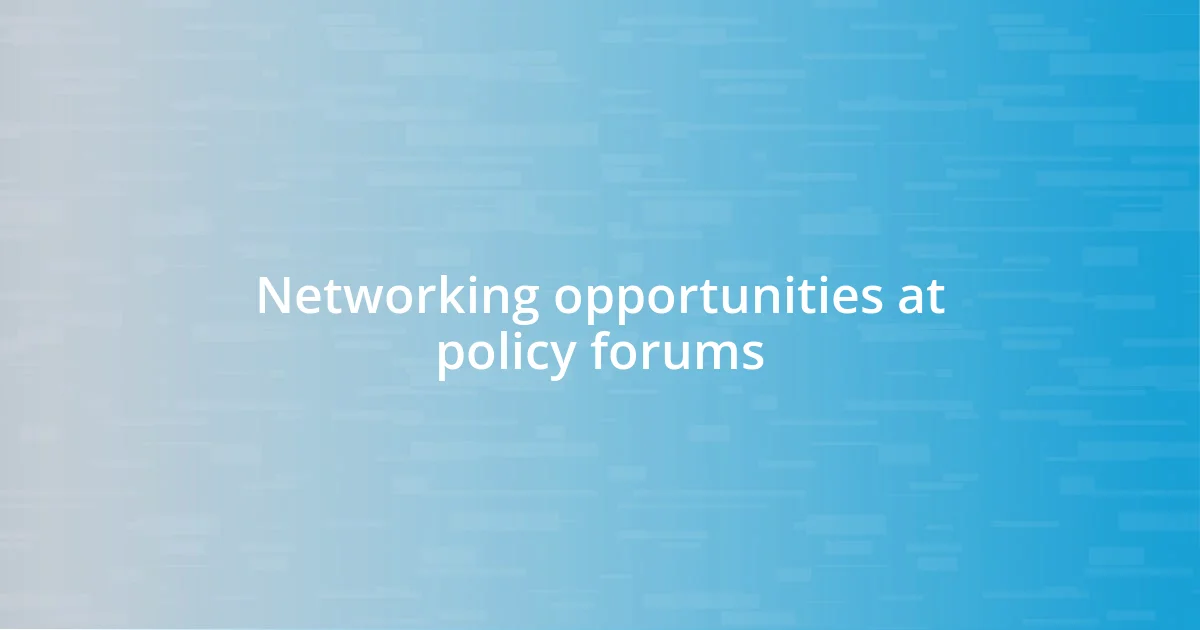
Networking opportunities at policy forums
Networking opportunities at policy forums abound, offering a unique chance to forge connections with like-minded individuals. I remember attending a forum where I wandered into a conversation with someone who shared my interest in renewable energy policy. Within minutes, we were exchanging ideas and insights, which sparked not just a professional rapport but also a friendship that has enriched my understanding of the field. Have you ever experienced that exhilarating moment when a simple chat leads to unexpected collaboration?
One of the most effective networking strategies I’ve encountered is personalizing your introductions. Instead of the usual “Hi, I’m X, and I do Y,” I learned to share a tidbit of my story that relates to the topic at hand. This approach made my introductions memorable and often sparked deeper discussions. For example, I once shared a brief account of how a specific policy change transformed my local community. That personal touch resonated with others, drawing them into a conversation that lasted well beyond the event itself.
Often, policy forums offer structured networking sessions, and I found these to be treasure troves of opportunity. During one such session, I discovered that many attendees were eager to collaborate on a project that aligned perfectly with my background. I was amazed by how simple it was to connect over shared goals. It made me realize that networking isn’t just about exchanging business cards; it’s about building lasting relationships that can significantly influence your work and, ultimately, the policies we advocate for. How can you leverage similar opportunities in your own experiences?
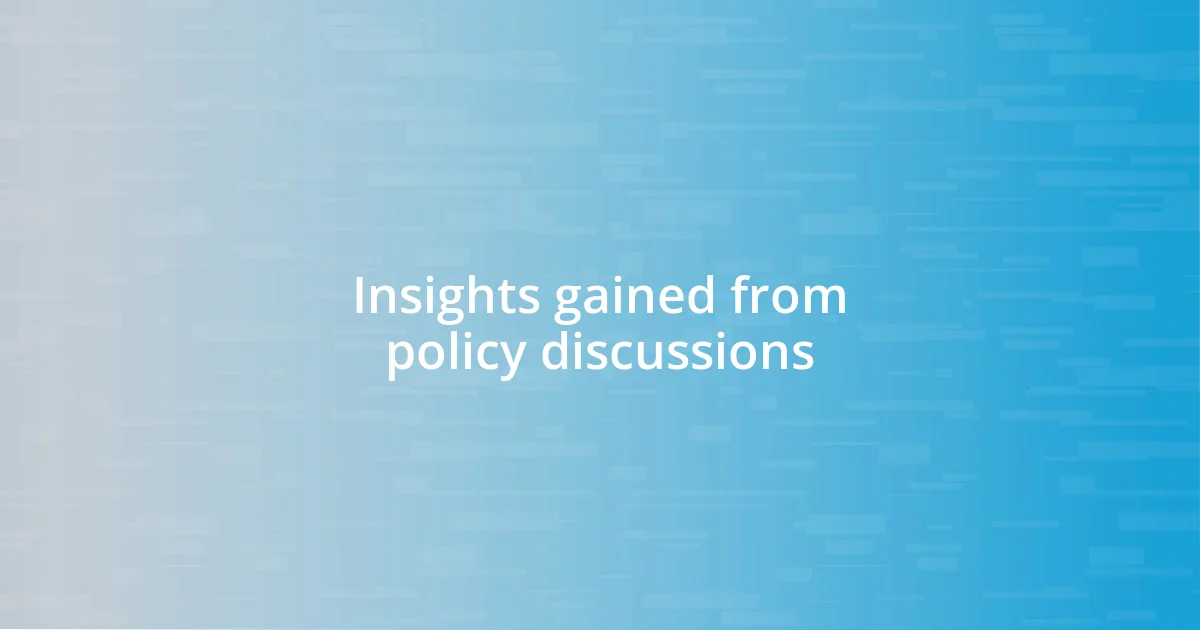
Insights gained from policy discussions
In my experience, participating in policy discussions reveals intricate layers of understanding about the issues at hand. During one particularly enlightening session, I noticed how various stakeholders framed their narratives around shared values, rather than focusing solely on data or outcomes. This shift in perspective made me realize that connecting emotionally with the issues can often sway public opinion more effectively than statistics alone. Have you ever felt a strong emotional connection to a policy that resonated with your values?
Another insight I gained was the importance of diverse perspectives. In one forum, a participant from a marginalized community shared her lived experiences related to a specific policy impact. It struck me how her story added depth and urgency to the conversation, highlighting aspects often overlooked by the broader audience. This moment reminded me that policy isn’t just about frameworks and regulations; it’s about real people and their experiences. Have you discovered how personal narratives can influence policy-making in unexpected ways?
Moreover, I learned that the power of collaboration cannot be underestimated. Through discussions with experts from different fields, I grasped the value of interdisciplinary approaches to problem-solving. For instance, a conversation with an environmental economist opened my eyes to the fiscal implications of certain policies, which I hadn’t considered before. This sparked an idea for a joint proposal that blended economic viability with environmental sustainability. Isn’t it fascinating how one conversation can ignite a collaborative project that might change the course of our discussions?
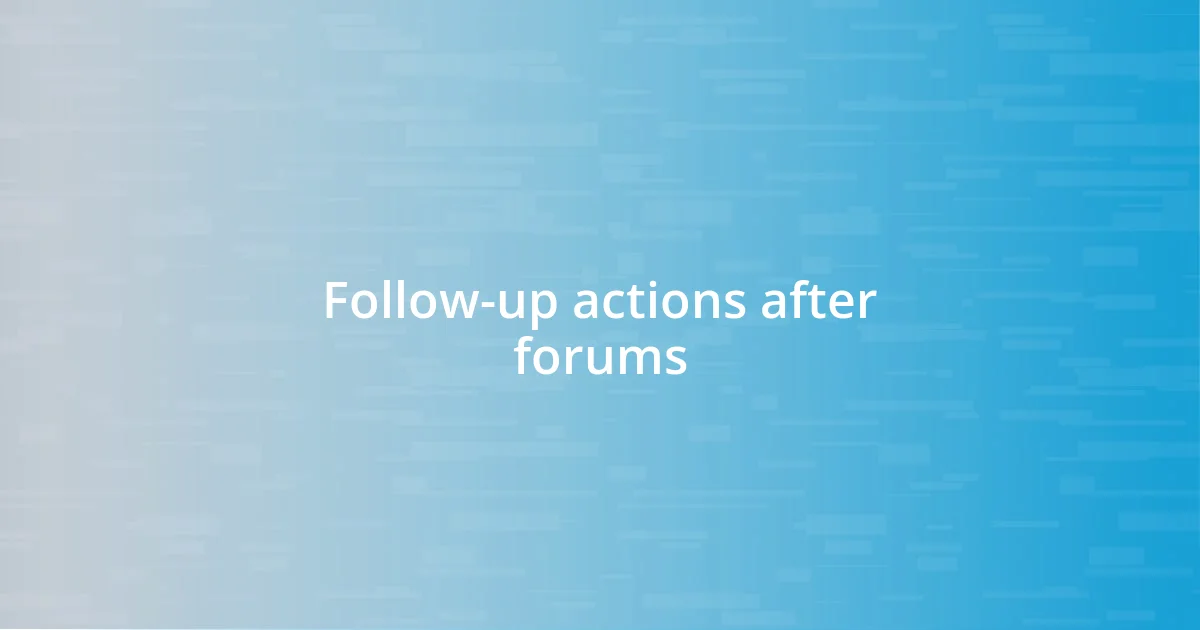
Follow-up actions after forums
Following a policy forum, it’s essential to implement a clear follow-up strategy to maximize the connections and insights gained. I remember one instance where I took the time to send personalized thank-you notes to several speakers and attendees I connected with. This simple gesture not only solidified our rapport, but it also opened doors for future discussions and collaborations—do you see how a few thoughtful words can transform a fleeting encounter into a meaningful connection?
I’ve also found that summarizing the key takeaways from the forum in a blog post or a social media update can solidify the information in your mind while sharing valuable insights with your network. After one particularly impactful event, I wrote about my experiences and the policies discussed, which resonated with others and sparked discussions online. This wasn’t just a way to reinforce what I learned; it also showcased my growing expertise and created a platform for others to engage with important issues. Have you ever considered how sharing your insights might invite broader conversations?
Lastly, one of the follow-up actions I prioritize is setting up a few meetings with individuals or organizations whose work aligns with mine. I took this approach after attending a forum focused on healthcare reforms. I reached out to a couple of health policy advocates I met there and suggested a casual coffee chat to explore potential collaboration on a project I was passionate about. The result? A productive partnership that has since helped to influence local health policies. Isn’t it remarkable how one determined follow-up can lead to meaningful change?
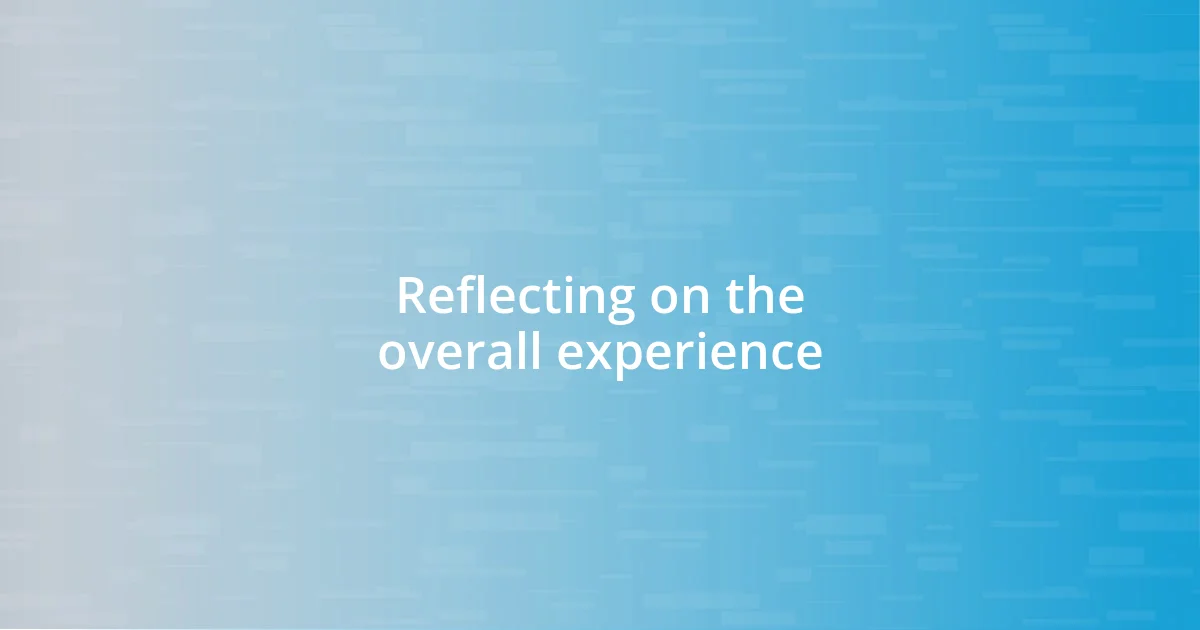
Reflecting on the overall experience
Reflecting on the overall experience of attending policy forums, I can’t help but appreciate the unique energy that fills the room. Each forum is a melting pot of ideas, where passionate individuals come together to discuss issues that matter deeply to them. I remember sitting in one particularly dynamic session, feeling a rush of excitement as diverse voices converged to challenge norms and propose solutions. Can you recall a time when collective passion stirred something inside you, igniting a desire to contribute?
What truly struck me was the level of vulnerability displayed by some participants. During a break, I overheard a small group discussing their personal stakes in the policies being debated. Their candid sharing of fears and hopes was a powerful reminder of why these discussions are crucial. It made me think: how often do we allow ourselves to express what these topics mean to us on a personal level? That moment reinforced the importance of emotional authenticity in policy discourse.
Ultimately, these forums not only broaden our understanding but also foster a sense of community. After one event, I found myself exchanging contact information with several attendees, united by our shared commitment to shaping meaningful change. Connecting with them on social media afterward transformed our brief interactions into ongoing dialogues. It left me pondering—aren’t the relationships we build in these spaces just as significant as the policies we discuss? It’s like creating a network of change-makers, and the potential for impact feels limitless.





